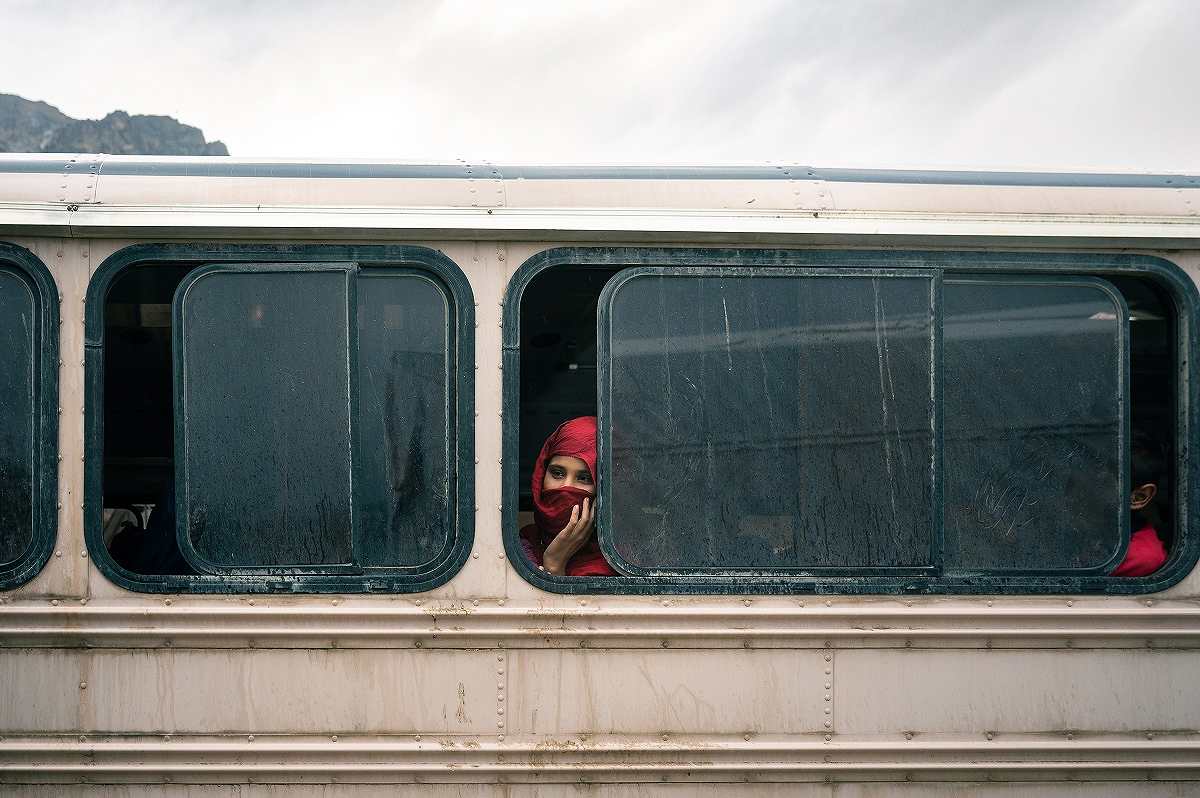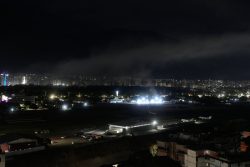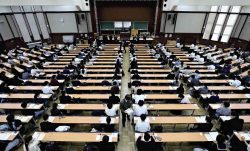
At the Torkham crossing Nov. 9, 20-year-old Zarlakht, who has returned with her family from Pakistan, sits on a bus going to a refugee camp.
15:01 JST, November 17, 2023
TORKHAM CROSSING, Afghanistan – At Pakistan’s main border crossing with northern Afghanistan, the narrow path into an uncertain future runs between two rusty iron fences and ends beneath a black-and-white flag of the Taliban-run government.
Many of the returning Afghan refugees who arrived here last week expected the worst as they stepped onto muddy Afghan soil amid torrential rain.
Caught up in a major deportation drive and forced to leave their homes in Pakistan, some had never been to the war-ravaged country their parents were born in. Others assumed they would barely recognize the cities they fled after the Taliban takeover in August 2021, where schools are now closed for many girls and music is prohibited.
But as they entered their transformed country, many refugees appeared puzzled. There was a poster wishing them a “good and comfortable life.” Rifle-wielding soldiers handed out food and wore bright garlands to celebrate the refugees’ return. Trucks stood ready to transport the returnees and their belongings to sprawling tent cities where 30,000 have found shelter and most families receive a $140 cash payment from the government.
“We wish we had returned sooner,” said Sardar Ali, 35, a laborer who was born in Pakistan to Afghan parents and who most recently worked in Rawalpindi.
Over 300,000 people have returned to Afghanistan in recent weeks, according to Afghan authorities. Pakistani officials say they want to make more than 1 million additional Afghans move back in the coming months.
Pakistan portrays the deportation drive as long overdue. For decades, the country has hosted millions of Afghans who arrived over several waves of migration beginning in the 1970s. Over 600,000 additional refugees fled to Pakistan in the wake of the Taliban takeover in 2021.
The deportations come amid mounting frustration in Islamabad with a surge in attacks in Pakistan that officials largely blame on religious militants suspected of hiding in Afghanistan’s rugged border mountains. By implicitly threatening to overwhelm Afghanistan with returnees, the Pakistani campaign appears designed to pressure the Afghan leadership to cracking down on the militants, analysts and humanitarian workers say. Afghan officials deny they are harboring the militants.
Pakistan’s deportation efforts may actually play into the hands of the Taliban-run government. It now has a rare opportunity to present itself as a government capable of managing a major humanitarian crisis and willing to welcome returnees, including those who fled the group’s 20-year armed campaign to seize control of Afghanistan.
While United Nations agencies, including the World Food Program and the International Organization for Migration (IOM), also provide assistance at the border, the Taliban is portraying itself as in control. The makeshift paths in the main refugee camp are lined with the Taliban’s Islamic Emirate flags. Soldiers on pickup trucks patrol the tent cities, where temporary mobile phone towers have been set up and Afghan carriers hand out free SIM cards.
“We pursued jihad so that we would one day be able to serve our people,” said Mohammad Adnan Junudi, 38, the military official in charge of reception operations on the Afghan side of Torkham, who joined the Taliban over a decade ago and says he was at one point jailed by U.S. forces. He called on all Afghans in Pakistan to return to their country. “The last few days have allowed us to prove who we really are.”
But the coming days could prove challenging. Forced to swap the tropical and subtropical climate of southern Pakistan for the frigid winters in the Hindu Kush, some of those who grew up in Pakistan are facing the first real winter in their lives. “We were born in Pakistan; we got married there,” said Mohammad Wali, 28, who used to live in Punjab province in Pakistan. “Why didn’t they at least let us stay until the end of the winter?”
Pakistan has in recent weeks responded to international criticism by making some concessions, saying that it will spare individuals who are waiting for resettlement in countries other than Afghanistan. But if Pakistan moves ahead with the deportation of most other undocumented Afghan refugees, it could still put an enormous strain on Afghanistan’s fragile economy and on a government that seeks to maintain tight control.
Many of the refugees who arrive in Torkham are laborers with few possessions. Some ran small food stalls or worked in brick factories. Some are women who were forced to leave Pakistan in a rush without their husbands.
Hadisa, clad in a blue burqa, said her husband was rounded up and arrested before they could leave for Afghanistan. The 35-year-old arrived in Torkham accompanied by a group of neighbors. But worried about traveling farther without a male relative, she has decided to wait for her husband near the Torkham crossing.
Abdul Nasir Kakar, who works for the IOM in Afghanistan, said 98 percent of those who arrive in Torkham are vulnerable and “in dire need of humanitarian assistance.”
Very few of the families arriving here include children who have gone to school in Pakistan, where educational facilities often are lacking in Afghan refugees’ neighborhoods.
But the promising welcome that refugees say they have received in Afghanistan may raise exaggerated expectations. Sardar Ali, the laborer from Rawalpindi, said he had high hopes that his 3-year-old daughter may eventually receive education. He was surprised to hear that girls are banned from attending school beyond sixth grade.
On the Pakistani side of the border, anxiety is running high, especially in Afghan neighborhoods that have so far been largely spared by immigration raids.
For years, teachers in Pakistan tried to keep their Afghan students’ spirits up by installing inspirational slogans at the entrances of their mud brick school buildings. “Education is the Kindling of a Flame,” reads a sign at the entrance of one of these schools in Peshawar, a city in northwestern Pakistan. These days, few students feel comforted by it.
Sixteen-year-old Gul Zameena Fazal, who grew up in Pakistan and still studies at the school, said it was her father, an uneducated driver, who encouraged her to seek a degree. “Seeing female students in Peshawar inspired him and it was his dream that I get a proper education,” she said.
Fazal said she wept when she learned that schools and universities shut for many girls in Afghanistan, and she is horrified by the possibility of having to move to the country. Fazal was too young during her only visit to Afghanistan a decade ago to be able to remember it.
Their teachers are uncertain how to help. Salbia Ahmadi, who teaches Pashto language classes at the school, said she is herself afraid of being expelled to Afghanistan. “Without women’s education, Afghanistan is being pushed back into the darkness,” she said.
After it seized power, the Taliban issued a general amnesty for former officials in the U.S.-backed government. But human rights officials say Afghan refugees may have reason to be concerned about a forced return to their home country. The United Nations has documented over 200 extrajudicial killings of former Afghan officials and members of the armed forces since the takeover in 2021.
The Taliban-run government rejects these concerns. “Our supreme leader told us not to bother anyone for anything and we will follow instructions, even if we pay with our lives for it,” said Adnan Junudi, the military official in charge of reception operations in Torkham.
The Afghan authorities say they are working on a plan to reintegrate the returnees into the labor market. Refugees’ skills and professional backgrounds are documented upon arrival, said Quraishi Badloon, head of the information committee at the Torkham crossing.
But for the Taliban-run government, the real challenge probably still lies ahead. Across Afghanistan, the authorities want to establish communities where returnees can settle – a plan that has already raised concerns that it may be used by the government to move returnees of the Pashtun ethnic group into areas where they so far are a minority.
Bakhtiar Khan, a 24-year-old refugee, said he’s willing to give Afghanistan a chance. “But if we see that life is getting harder and harder, me and my friends will definitely think about ways to move abroad again,” he said.
"News Services" POPULAR ARTICLE
-

Japan’s Princess Kako Marks 31st Birthday, Contributed to Key Events This Year
-

Arctic Sees Unprecedented Heat as Climate Impacts Cascade
-

Brigitte Bardot, 1960s Sultry sex Symbol Turned Militant Animal Rights Activist Dies at 91
-

At Least 7 Explosions and Low-Flying Aircraft Are Heard in Venezuela’s Caracas
-

South Korea Prosecutor Seeks Death Penalty for Ex-President Yoon over Martial Law (Update)
JN ACCESS RANKING
-

Japan Govt Adopts Measures to Curb Mega Solar Power Plant Projects Amid Environmental Concerns
-

Core Inflation in Tokyo Slows in December but Stays above BOJ Target
-

Major Japan Firms’ Average Winter Bonus Tops ¥1 Mil.
-

Tokyo Zoo Wolf Believed to Have Used Vegetation Growing on Wall to Climb, Escape; Animal Living Happily after Recapture
-

JAL, ANA Cancel Flights During 3-day Holiday Weekend due to Blizzard



























